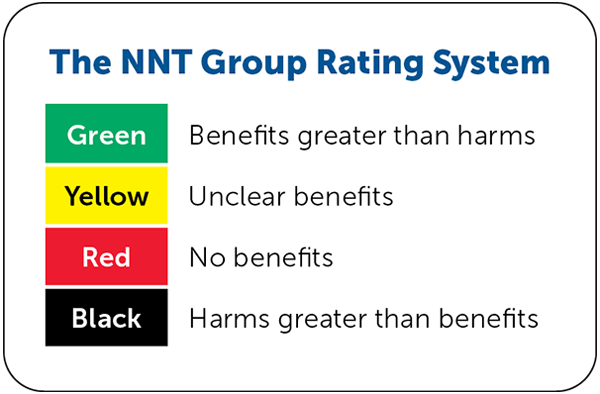
Am Fam Physician. 2019;100(9):online
Author disclosure: No relevant financial affiliations.

Details for This Review
Study Population: Patients with acute coronary syndrome (ACS) who underwent percutaneous coronary intervention (PCI)
Efficacy End Points: Death, heart attack, stroke
Harm End Points: Major bleeding, dyspnea

| Benefits | Harms |
|---|---|
| No patients were helped | 1 in 166 patients had a major bleeding event |
| 1 in 13 patients developed dyspnea |
Narrative: Dual antiplatelet therapy (aspirin plus clopidogrel [Plavix] or ticagrelor [Brillinta]) compared with aspirin alone after PCI modestly reduces nonfatal events such as heart attack and stroke.1,2 This finding has led some to believe that better antiplatelet agents could improve outcomes further; ticagrelor has been proposed as such an agent.
The systematic review summarized here included 11 trials and five observational studies that enrolled a total of 25,805 patients with ACS undergoing PCI and those with stable coronary artery disease.3 The patients included were predominantly men, with a mean age of 54 to 72 years. The trials enrolled patients from the United States, United Kingdom, Japan, Korea, Spain, Italy, France, Taiwan, and China.
Ticagrelor, compared with clopidogrel, did not reduce heart attacks, strokes, deaths, or stent thrombosis, but it did increase major bleeding (absolute risk difference [ARD] = 0.6%; odds ratio [OR] = 1.52; 95% CI, 1.01 to 2.29; number needed to harm [NNH] = 166). Major bleeding was defined as a significant drop in hemoglobin (> 3 g per dL [30 g per L]) or requiring blood transfusion, or intraocular bleeding resulting in vision loss or complete blindness.3
More patients in the ticagrelor group experienced dyspnea (ARD = 7.6%; OR = 2.64; 95% CI, 1.87 to 3.72; NNH = 13), which could be one reason why there was a significantly higher rate of drug discontinuation among patients in this group (ARD = 1.7%; OR = 5.67; 95% CI, 1.26 to 25.54; NNH = 59).3
Caveats: The quality of evidence was variable, and it is specifically important to note the inclusion of five observational studies. In our opinion, this is a methodologically important error that is compounded by pooling their results with clinical trial data. This calls into question all results, particularly those that tended to hover near statistical significance. The observational data may have diluted or enhanced any effect. Some trials also included patients with stable coronary artery disease. However, a subgroup analysis that did not include these patients found similar results.
Although based on the guideline that patients undergoing PCI should receive dual antiplatelet therapy (aspirin plus clopidogrel or ticagrelor), not all trials reported the exact number of patients receiving this therapy. However, studies that listed these numbers reported nearly 100% of the patients received dual antiplatelet therapy.
Some individual trials in the meta-analysis report benefits for reduction of heart attack and mortality. The largest study (Platelet Inhibition and Patient Outcomes [PLATO] trial, funded by the manufacturer of ticagrelor) included more than 18,000 patients, finding a statistically significant benefit for reduction of heart attack (1.1%) and mortality (1.4%). Unlike most of the studies in the meta-analysis, the PLATO trial followed patients for 12 months.4 This raises another limitation—variable follow-up periods. Some trials reported one-month or in-hospital outcomes, raising the concern that these trials may have underestimated the effectiveness of ticagrelor. This notion is challenged, however, by a study of 800 patients with 12 months of follow-up (also funded by the manufacturer of ticagrelor), which attempted to reproduce the PLATO trial in an Asian setting. The study failed to find any benefit and bordered on showing overall harm.5
Notably, ticagrelor is much more expensive than clopidogrel. As of March 2019, the price for a one-month supply of each was approximately $400 and $11, respectively.6
The 2016 American College of Cardiology/American Heart Association guideline on dual antiplatelet therapy in patients with coronary artery disease makes a class IIa recommendation that ticagrelor is preferential to clopidogrel for non-ST-elevation ACS and ST-elevation myocardial infarction in patients who undergo PCI. We believe that the existing evidence does not support this recommendation, because there was no statistically significant benefit in stent re-thrombosis or all-cause mortality, whereas there was evidence of increased risk of harm compared with clopidogrel.7
In summary, the existing evidence is poor, includes observational data pooled with trial data, and finds only harm, no benefit, with ticagrelor. We have assigned a color recommendation of red (no benefits) because of the uncertainty about benefits and evidence of potential harms. We await more rigorous review and further relevant trials.
